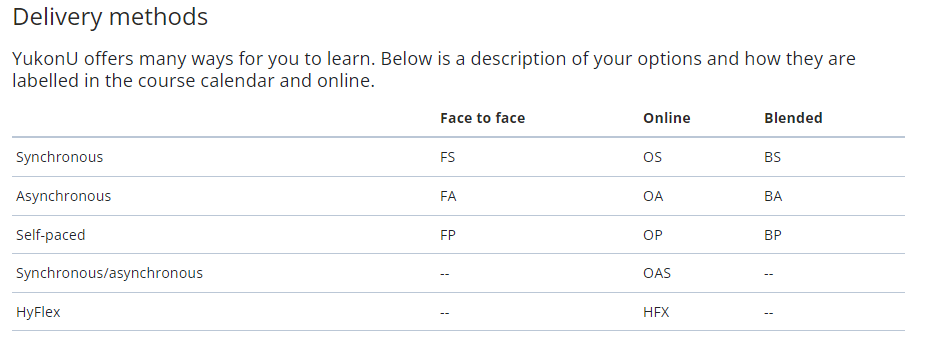Wanted: Open minds with bright futures.
Yukon University’s Liberal Arts programs provide a foundation to a variety of social science and humanities disciplines that can support a wide range of career opportunities for you to explore. Courses in Liberal Arts and those available from other program areas make it easy to customize your certificate or diploma to meet your specific goals.
Liberal Arts
 The choice is yours! Scheduled courses are offered face-to-face and online. Some courses are online with no set meeting times, some have weekly scheduled video-conferenced sessions, while others run entirely in person or in a hyflex combination. See the course pages and course outlines for details. Spring courses generally run online to ensure the widest accessibility.
The choice is yours! Scheduled courses are offered face-to-face and online. Some courses are online with no set meeting times, some have weekly scheduled video-conferenced sessions, while others run entirely in person or in a hyflex combination. See the course pages and course outlines for details. Spring courses generally run online to ensure the widest accessibility.
Contact the School of Social Sciences and Humanities or a program advisor for assistance or for more information about our programs and courses.
The School of Social Sciences and Humanities has one- and two-year programs that are exceptionally well suited to students who wish to begin a university degree or related program in areas that can include:
- Arts and arts organizations
- Communications, editing, publishing, and podcasting
- Education
- Educational or Clinical Psychology
- Environmental Policy and Management
- Interdisciplinary Studies
- Literature and Letters
- Public History and Writing
- Public Policy and Research
- Recreation
- Social Services
- Social Work
- Tourism
- And so many more
Our Social Sciences and Humanities programs (both Social Sciences and Humanities and northern studies) reflect the belief that degree-bound students ought to acquire solid critical thinking, research and communication skills through introductory study in a variety of social science and humanities disciplines. They also present an ideal opportunity for continuing education or for exploring various educational and career paths.
To graduate, Certificate students must
- complete ENGL 100 and ENGL 101 (6 credits)
- complete two social-science electives (6 credits)
- complete two science electives (6 credits)*
- complete four open and Liberal Arts electives (Note: 060-level courses and lower will not apply) (12 credits)
In addition, Certificate students must
- demonstrate Yukon First Nations Core Competency (YFN CC)
- complete at least 50% of the work at Yukon University
- maintain a cumulative GPA of 2.0 (C average)
Diploma students must
- complete all Certificate requirements (that is, 30 credits and demonstrate YFN CC)
- complete two 200-level humanities electives (6 credits)
- complete four Liberal Arts/Science electives (12 credits)
- complete four Open or Social Sciences and Humanities or Science electives (Note: 060-level courses and lower will not apply) (12 credits)
In addition, Diploma students must
- complete at least 6 courses numbered 200 or higher (18 credits)
- complete at least 50% of the work at Yukon University
- maintain a cumulative GPA of 2.0 (C average)
NOTE ABOUT LANGUAGES: While not a requirement, study of a second language is encouraged so students meet the second-language requirements of many universities.
IMPORTANT NOTE ABOUT LIBERAL ARTS/SCIENCE AND MANAGEMENT AND OPEN ELECTIVES: Liberal Arts certificate students may take up to 6 credits, and diploma students up to 12 credits, from outside the School of Social Sciences and Humanities and School of Science (but excluding Continuing Studies).
However, students must recognize that such coursework may not be transferable to programs at other post-secondary institutions and may result in a credit shortfall upon transfer. Students working towards a degree or program at another institution or planning to continue post-secondary studies in the future should check their course selection with a Program Advisor.
*NOTE: Science elective courses do not require labs. Please check with a Program Advisor to discuss options or see the program guide for course suggestions.
Yukon University recognizes that a greater understanding and awareness of Yukon First Nations history, culture and journey towards self-determination will help to build positive relationships among all Yukon citizens. As a result, you will be required to achieve core competency in knowledge of Yukon First Nations.
For details, visit Yukon First Nations Core Competency
Any undergraduate-level Yukon University course that is part of the British Columbia Council on Admission and Transfer (BCCAT) system is eligible for dual credit. Many courses in the School of Liberal Arts are suitable for high-school students to take as dual credit courses providing any prerequisites are met.
Students have often selected ENGL 100, HIST 140, PSYC 100, PSYC 101, and SOCI 100 for dual credit, but many other first-year courses and some second-year courses are options. Beginning in Fall 2023, ENGL 101 is available.
For more information about dual credit for Yukon high-school students, see the Dual Credit program page.
Fees
Tuition for credit programs is calculated per course credit. See money matters for more information.
Some programs and courses have additional fees - see Ancillary Fees.
Student financial awards
Education is an investment in your future, your family and your community. Yukon University is pleased to support that investment by offering some of the most competitive tuition rates in the country, as well as several student financial awards to help offset your educational and living costs.
Financial assistance
There are government programs, scholarships, bursaries, awards and First Nation funding available to financially support you throughout your academic career.
See money matters for more information, or talk to our financial advising staff in the Student Services Centre. Email or call 867 456 8574 to make an appointment.

Source: Registering for academic courses
Face to face
Denoted by an F in the first letter of the delivery code (e.g., FS, FA, FP).
Students and the instructors to be present in the same physical location for class time, either in a classroom, lecture theatre or another learning environment.
Online
Denoted by an O in the first letter of the delivery code (e.g., OS, OA, OP).
Students and instructor connect through online tools and are not required to be in the same physical space for any portion of the course. Students will access and submit all coursework over the internet.
Blended
Denoted by a B in the first letter of the delivery code (e.g., BS, BA, BP).
Includes a combination of online and face to face learning activities and may require connecting with instructors and other students at specific prescheduled times through the course. For example, students can complete online self-paced assignments by a certain date, then meet on-site or online for additional learning activities.
Synchronous
Denoted by an S in the second letter of the delivery code (e.g., FS, OS, BS).
Students are expected to participate in course activities at specific scheduled times, either on-line through video conference or in person for face to face sessions.
Asynchronous
Denoted by an A in the second letter of the delivery code (e.g., FA, OA, BA).
Students are not required to connect with instructors and other students at specific pre-scheduled times but must submit course work according to a schedule set by the instructor, often on a weekly basis. Meeting times may be scheduled between instructor and students or between students as needed through the course.
Self-paced
Denoted by a P in the second letter of the delivery code (e.g., FP, OP, BP).
Students are not required to connect with instructors and other students at specific times and may complete their course work at their own pace within the timeframe of the course, set by the instructor. Meeting times may be scheduled between instructor and students or between students as needed through the course.
Online asynchronous/synchronous
Denoted by an AS in the second and thirds letters of the delivery code (e.g., OAS)
Course is delivered online with a combination of real-time (synchronous) instruction and independent (asynchronous) instruction.
HyFlex
Denoted by HFX
Courses are delivered both in person and online at the same time by the same faculty member. Students can then choose for each and every class meeting whether to show up for class in person or to join it online. The underlying design ethos behind the HyFlex Model is flexibility and student choice.
In all School of Social Sciences and Humanities programs, students may find opportunities to engage in hands-on scholarship and research experiences beyond the classroom.
These experiences can enrich learning and help prepare students for future careers or advanced studies. Through scholarship, students develop critical thinking and gain insights into the research process. Working with faculty mentors or on independent projects, students discover new horizons and achieve personal growth.
Yukon University and its academic Senate has adopted the 2019 report of the Scholarly Activity Engagement Team, Scholarly Activity at Yukon University. The following has been excerpted from the report:
OUR DESCRIPTION OF SCHOLARLY ACTIVITY
Scholarly activity is an intentional, sustained process of creating, validating and transferring knowledge. Scholarly activity happens on the land, the water and in the sky, lab, field and all learning spaces; it reaches a relevant audience and engages community.
PRINCIPLES
- We honour many ways of knowing.
- Scholarly work may be created and validated by those who hold many kinds of knowledge, including Indigenous, natural sciences, social sciences and the humanities.
- Scholarly activity calls on critical reflection and ethical consideration at every stage.
- Scholarship builds connections within the university and beyond.
- We differentiate between professional development (inward facing) and scholarly activity (outward facing).
- We recognize that research and scholarship exist within political systems, yet we endeavour to maintain independence and integrity.
